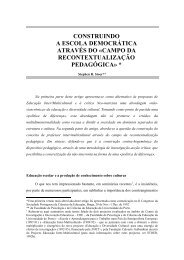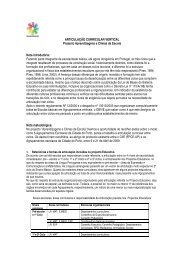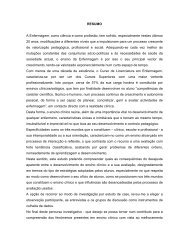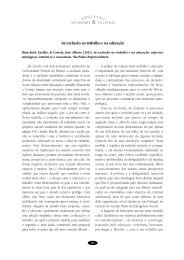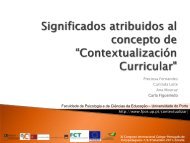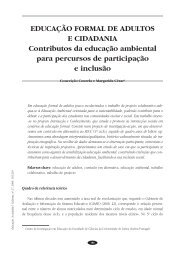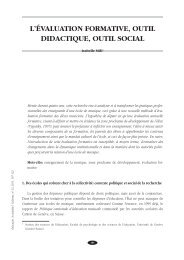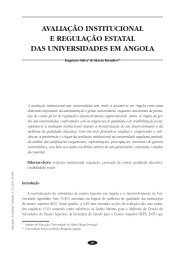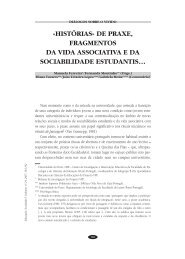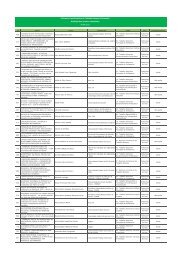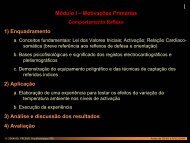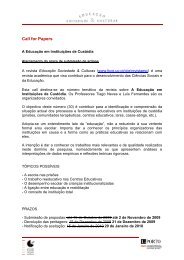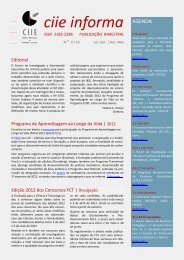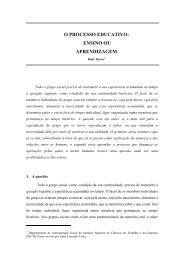REFLECTINGON AN ACADEMIC PRACTICE TOBOOST GENDER ...
REFLECTINGON AN ACADEMIC PRACTICE TOBOOST GENDER ...
REFLECTINGON AN ACADEMIC PRACTICE TOBOOST GENDER ...
Create successful ePaper yourself
Turn your PDF publications into a flip-book with our unique Google optimized e-Paper software.
Committee on Equal Opportunities for Women and Men (2010). Promoting the most favourable genderequality laws in Europe Doc (doc. 12427). Retrieved January 26, 2012, from http://assembly.coe.int/Documents/WorkingDocs/Doc10/EDOC12427.pdfCook-Sather, Alison (2007). Resisting the impositional potential of student voice work: Lessons for liberatoryeducational research from poststructuralist feminist critiques of critical pedagogy. Discourse: Studies inthe Cultural Politics of Education, 28(3), 389-403.Crenshaw, Kimberle (1989). Demarginalizing the intersection of race and sex: A black feminist critique ofantidiscrimination doctrine, feminist theory and antiracist politics. The University of Chicago Legal Forum,4, 139-167.Davis, K. (2008). Intersectionality as buzzword: A social science perspective on what makes a feminist theorysuccessful. Feminist Theory, 9(1), 67-86.Dillabough, Jo-Anne (1999). Gender politics and conceptions of the modern teacher: Women, identity andprofessionalism. British Journal of Sociology of Education, 20(3), 373-394.Eisenstein, Hester (1995). The Australian femocratic experiment: A feminist case for bureaucracy. In MyraMarx Ferree & PatriciaYancey Martin (Eds.), Feminist organizations: Harvest of the new women’s movement(pp. 69-83). Philadelphia, PA: Temple University Press.Federici, Silvia (2004). Caliban and the witch: Women, the body, and primitive accumulation. Brookling, NY:Autonomedia.Fernández, Eduardo Encabo, & Valero, Amando López (2002). Competencia comunicativa, identidad degénero y formación del profesorado. Revista Interuniversitaria de Formación del Profesorado, 43,113-122.Ferrer, Victoria, & Bosch, Esperanza (2005). Estudios de género y psicología: Algunas reflexiones sobre elestado de la cuestión en nuestro país. In Virginia Maquiera, Pilar Crespo, Maria Teresa Gallego, OtiliaRomero, Margarita Ortega & Pilar Pérez (Eds.), Democracia, feminismo y universidad en el siglo XXI (pp.259-273). Madrid: Universidad Autónoma de Madrid.Freixas, Anna, Fuentes Guerra, Marina, & Luque, Bárbara (2007). Formación del profesorado y diferenciasexual. Revista Fuentes, 7, 52-89.Frisby, Wendy, Maguire, Patricia, & Reid, Colleen (2009). The «f» word has everything to do with it: Howfeminist theories inform action research. Action Research, 17(1), 13-29.Gay, Geneva, & Kirkland, Kipchoge (2003). Developing cultural critical consciousness and self-reflection inpreservice teacher education. Theory Into Practice, 42(3), 181-187.García, Adela (2004). Género y ciudadanía. Barcelona: Icaria.García-Pérez, Rafael, Rebollo-Catalán, Maria A., Vega, Luisa, Barragán-Sánchez, Raquel, Buzón, Olga, &Piedra, Joaquín (2011). El patriarcado no es transparente: Competencias del profesorado para reconocerdesigualdad. Cultura y Educación, 23(3), 385-397.Giraldo, Elida, & Colyar, Julia (2012). Dealing with gender in the classroom: A portrayed case study of fourteachers. International Journal of Inclusive Education, 16(1), 25-38.Griffin, Christian (1989). «I’m not a women’s libber, but…»: Feminism, consciousness and identity. In SuzanneSkevington & Deborah Baker (Eds.), The social identity of women (pp. 173-93). London: Sage.125



